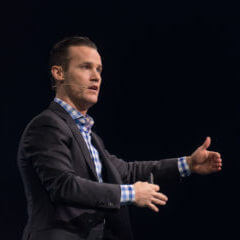As founder and CEO of Karrikins Group, Peter Sheahan has worked with leaders from Apple, IBM, Hilton, Pfizer, and other Fortune 500 companies on their growth strategies. Those are complex undertakings, focusing on such things as market penetration and competitive analysis. However, Sheahan told Convene, one of the biggest challenges for every organization in today’s demanding, always-on business environment boils down to this: We do too much.
“We all tend to overcommit,” Sheahan said in advance of his Main Stage appearance on June 12 at PCMA’s Education Conference in Cleveland. “It’s not uncommon to have 63 initiatives owned by four people in some organizations. And then, we all wind up working on urgent requests, and those last-minute tasks create obstacles on a journey of transformation in an organization. We all need to be able to look to the long-term horizon.”
As far what’s on the horizon for PCMA Education Conference attendees, Sheahan filled Convene in on highlights of his upcoming talk in Cleveland.
The Karrikins Group has written a great deal about the value of “deselection.” Can you share some insights into the importance of deselection in today’s business environment?
None of us wake up in the morning with nothing to do. We find ourselves facing increasingly complex business challenges, but we’re expected to manage them with fewer resources while striving for growth. That’s about as difficult as it gets. Deselection acknowledges the fact that you have to be very clear about what matters most. Only by doing what matters most will you find success.
Deselection may not be easy for individual employees due to a pressure to say yes to their bosses about everything. How can leaders help to make it okay to question tasks or projects that aren’t a valuable use of someone’s time? What’s the secret to a culture of deselection?
As a leader, the first step is to fully articulate what success looks like and make a realistic assessment of what that work will entail for everyone. Assess that against the current free time, which may be zero. Then, compare that with the organization’s current capacity levels, and ask yourself what you have the ability to stop doing and what your employees can also take off their plates.
The main challenge is that many organizations are quite cost-conscious, and therefore, the appetite for risk-taking goes down. If you want to create a culture where deselection can lead to innovation, there are certain behaviors required. You need to make people feel comfortable with taking risks. Rather than taking the usual approach of celebrating successes with awards for the top achievers and best performers, you should also celebrate failure. Make a big deal of the most worthy bets that didn’t pay off. Those are equally as important as the No. 1 sales goal. Instill the belief that progress is more important than perfection.
Switching gears from the work you do on a daily basis to your appearance at Education Conference, what will your Main Stage speech cover? How does it connect to the business events and conferences industry?
I want to help attendees find opportunities for change in the midst of disruption. Some of the factors that will redefine the business events industry — millennials’ willingness to join associations, video content, and the heightened demand for ROI, to name a few — have been on the periphery for the past decade. They’ve been talked about quite a bit, but they are now gaining critical mass.
As those changes move at a faster pace, the PCMA community must confront a series of truths. You must be willing to tell yourself the truth about the level of disruption and what it could really mean for your organization and your event. You want to tell yourself the truth about the opportunities, though, not just the threats. Most importantly, you need to tell yourself the truth about how far away you are from seizing those possibilities.
What are some of the key lessons you hope the audience takes home from your talk?
I’ve never met anyone anywhere who said that they weren’t open to change, but when push comes to shove, they’re actually about everyone else being open to change first. As meeting professionals embrace the role of the business-event strategist, they have the ability to unlock new opportunities, but it requires a mindset shift. Rather than focusing on short-term tasks such as selling a certain number of exhibit booths by a deadline, the focus must be on solving higher-order problems and taking intelligent risks. When attendees return home, I hope they aim to move closer toward the edge of disruption — not away from it.
Peter Sheahan will deliver a Main Stage presentation at PCMA Education Conference 2018, being held in Cleveland on June 10–13. For more information, visit pcmaeducon.org.
To learn more about Peter Sheahan and Karrikins Group, visit karrikinsgroup.com.


